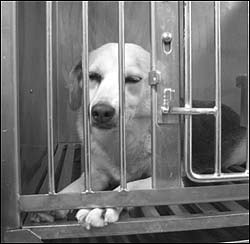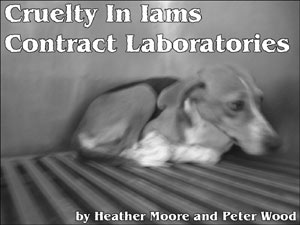Iams pet food company may put forth a wholesome animal-loving image, but it pays contract laboratories to conduct cruel nutritional tests on animals for research and product development. For nearly 10 months in 2002 and early 2003, an investigator from People for the Ethical Treatment of Animals (PETA) went undercover at an Iams' contract laboratory and found that extreme cruelty is the hidden ingredient in every can of Iams dog and cat food.
What PETA's investigator saw in one of the laboratories that Iams paid to do its dirty work will outrage decent individuals–no matter how they feel about the ethics of using animals for experimentation. Iams' dogs and cats were confined in barren cement runs or small stainless-steel boxes, many for as long as six years. Dogs were often trapped and/or injured because they were forced to navigate and sleep on slatted flooring.
There were no windows in any of the facilities and temperatures in the buildings that housed dogs dipped to 30°F in the winter and soared above 90°F in the summer. The ammonia fumes in the animal trailers were so overpowering that employees sometimes had to go home because their eyes burned so bad. The animals never got to leave.
One building was so dark and dungeon-like that the investigator had to leave the door open just to see the dogs, some of whom screamed for attention, while others walked in non-stop circles in their cages. None of the animals were given exercise or anything to enrich their miserable lives. PETA's investigator fought for six months just to be allowed to give a dog a simple toy.
Painful Procedures
Sixty dogs had chunks of muscle cut out of their thighs and many were piled together on a filthy, paint-chipped concrete floor, violating government regulations that require sterile surgical conditions. Two of the dogs were later found dead in their cages. One of them had been suffering intensely for at least 11 days prior to her death. Her report read: "pyometra [infection of the uterus] possible, bloody discharge from vulva–foul odor present. Lethargic, not eating well, dehydrated."
Twenty-seven of the dogs subjected to the muscle biopsies were intentionally killed, even though Iams claimed that it would not conduct any experiment that resulted in the deaths or euthanasia of animals.
Laboratory employees stuck tubes down dogs' throats and forced them to ingest vegetable oil. One employee found an Iams' dog dead in his cage, bleeding from his mouth. Many dogs had such severe tartar buildup on their teeth that it was painful for them to eat.
Cats were kept in a cinderblock room with crude wooden "resting" boards that had nails sticking out of them. One of the boards fell on a cat, crushing her to death. The lab director did not remove the boards when the cat was crushed–only when he was told the lab was going to be inspected.
According to a laboratory employee, one Iams' cat had not eaten for three days and died, apparently without having received any veterinary care whatsoever. Kittens used in a growth study were sometimes doubled up in cages, another violation of government standards.
The animals were treated as mere research tools. When the investigator reported that Humbug, an Iams' dog, was limping, she was told by a vet tech that the laboratory had an x-ray machine that dated back to the 1960s but no film for it and that the lab director preferred to kill, rather than treat, animals with broken bones.
Shortly before PETA's investigator left, the lab director instructed the vet techs to debark all the Iams' dogs, as he was being disturbed by their desperate cries for attention. The investigator e-mailed Iams representatives with this information–as Iams had claimed that it would not surgically alter its animals–but Iams did nothing and the painful procedures were performed anyway.
See No Evil, Hear No Evil, Say No Evil
Iams' officials were well aware of the conditions at the lab, but they continuously looked the other way. PETA's investigator videotaped Iams' representatives touring the facility. They saw the sad, distressed dogs. They felt the sweltering heat and humidity in the kennels. Then they walked out.
An Iams' "behaviorist" saw dogs spinning in their cages out of madness and yet said nothing. An Iams' cat dental researcher even overheard two employees talking about animals who were treated inhumanely at the facility yet Iams continued to conduct business there as usual.
An Iams' veterinarian inspected a group of dogs purchased for testing and saw that one of the dogs had given birth in a cement kennel and had not been provided with anything to rest on while nursing her puppies. The vet did nothing. A puppy and an adult dog from that group died during our investigation, most likely the result of neglect and temperatures that fell below 34 degrees in the building.
 Lies, Lies and More Lies
Lies, Lies and More Lies
In response to public outrage at the conditions PETA uncovered, Iams moved to convince consumers that is has the best interests of its "four legged associates" at heart. Iams severed ties with the laboratory, consolidated the number of contract laboratories it does business with, and formed an International Animal Care Advisory Board. Unfortunately though, the steps Iams has taken really have more to do with improving its reputation than the welfare of the animals imprisoned in its dozens of contract laboratories.
Because Iams has lied in the past, PETA is doubtful that the company can be trusted to make significant and long-lasting changes to the way animals in its tests are treated. In a face-to-face meeting in 2001, Iams had assured PETA that all of the animals used in its tests had resting boards, were exercised, socialized, and received "retirement." Iams also lied to the public when it claimed that it was not aware of the horrendous conditions PETA uncovered during its investigation.
As the videotape taken by PETA's investigator shows, Iams' officials saw the cruelty with their own eyes, but not one of them did anything to alleviate the animals' suffering.
PETA's investigator is seen and heard on countless videotapes practically begging laboratory personnel for assistance in implementing improvements she researched and designed, including letting the dogs outside, providing resting boards, grooming, and more. Her repeated requests for training, guidance, and assistance from Iams were ignored.
Iams and its International Animal Care Advisory Board–which includes a number of people who are beholden to Iams for one reason or another–simply have no way of knowing what is happening to the animals inside the company's numerous contract testing facilities at any given time.
Nevertheless, in a desperate attempt to gain approval for its laboratory experiments on dogs and cats, Iams is boasting that it received support from the National Animal Interest Alliance, which is actually a front organization that promotes and defends those who abuse and exploit animals, including Ed Walsh, an infamous Boys Town National Research Hospital kitten killer, and Teresa Platt, of Fur Commission USA.
Humane Home Tests
No one who truly cares about animals would condone or support the use of animals in such cruel tests.
PETA is calling on the Iams' company to stop conducting cruel nutritional experiments, and, instead, rely on laboratory analysis of formulas for nutritional composition, in-home palatability studies using dogs and cats whose human companions have volunteered them, and collaborative studies with veterinary clinics that have patients who have diseases or conditions of interest to Iams.
More than 30 companies, such as Evolution Diet, Inc., Harbingers of a New Age, Natural Life Pet Products, Inc., Petguard, Veterinary Nutritional Formula, and Wysong Professional Diets, conduct humane home testing.
PETA is actively encouraging people with animal companions to refuse to buy Iams products until Iams stops hiring contract laboratories to conduct nutritional studies. In September 2003, PETA members protested at Iams' offices in Dayton and Cincinnati, Ohio; Toronto, Canada; and Europe to kick off an international campaign against the company. PETA members and their canine companions have also staged "snarl-ins" at shopping centers around the US in an effort to persuade people to leave Iams products on store shelves.
PETA is even preparing a scrapbook of supporters and their companion animals–who will not be eating Iams–to present to the company. As a result of PETA's campaign, many caring consumers, pet supply stores, and a vet clinic as far away as New Zealand, now refuse to do business with Iams.
The dogs and cats used in Iams' tests are just as special as our dogs and cats at home and deserve companionship, comfortable beds, toys, and humane treatment. Iams is deceiving customers by promoting an ethical image while conducting cruel nutritional tests on animals and should be boycotted.
•
Heather Moore is a staff writer for People for the Ethical Treatment of Animals (PETA) and a regular contributor to IMPACT press.
Peter Wood is a research associate for PETA.
Email your feedback on this article to editor@impactpress.com.
Make an IMPACT
Other articles by Heather Moore:




 Lies, Lies and More Lies
Lies, Lies and More Lies